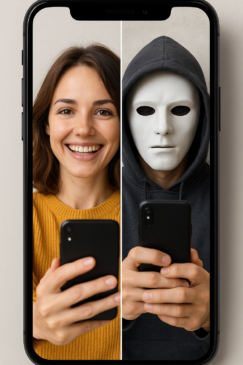There are certain lines in friendship you expect never to be crossed. For many, those lines are as simple as honesty, respect, and trust. But for Megan Carter, that trust was shattered when her college roommate, Holly, took her identity—her photos, her words, her digital self—and used it to catfish someone. It’s a story that goes far beyond digital drama, and it reveals just how deeply betrayal can cut in the social media age.
The Perfect Friendship—Or So She Thought
When Megan started her sophomore year at the University of Colorado, she was thrilled to meet Holly, her new roommate. Holly was outgoing, quick-witted, and had a knack for making friends instantly. They hit it off over late-night study sessions, road trips to the mountains, and long conversations about their dreams. Megan even helped Holly set up her Instagram, showing her how to curate photos, write witty captions, and make stories pop.
But as the semester wore on, Megan noticed Holly becoming obsessed with social media—especially with how she looked online. Holly would spend hours editing photos and sometimes grew moody if her posts didn’t get enough likes.
The Discovery
One evening, Megan was scrolling through Instagram when she received a message from a stranger, Sam Whitaker. The message read, “Hey, this is going to sound weird, but I think someone’s using your photos to talk to me?” Attached was a screenshot of a profile Megan had never seen, but the images were unmistakably hers—pictures from hikes, brunches, even a childhood photo she’d posted for Throwback Thursday. The account, “AnnaMarie_Loves,” had been messaging Sam for weeks, and the messages sounded eerily like things Megan would say.

Megan’s hands shook as she confronted Holly. “Holly, do you know anything about this fake account?” Holly tried to laugh it off at first, but eventually admitted the truth. “I just wanted to see if I could do it—make someone fall for me, or at least for the person I could be if I looked like you. I didn’t think it was a big deal.”
The Fallout
Megan was stunned, not only by the betrayal but by how casual Holly was about it. The next days were a blur of damage control: reporting the fake account, messaging Sam to apologize, and trying to salvage her own online reputation. Holly deleted the account, but the damage was done.
Word spread quickly among their friend group. Some sympathized with Holly, claiming it was “just a joke.” Others took Megan’s side, pointing out how invasive and wrong it was to steal someone’s identity. Megan felt exposed in a way she never had before. Every photo, every post now felt risky. She began second-guessing what she shared online, worried someone else might try the same thing.
The Conversation About Boundaries
In the following weeks, Megan found herself struggling to trust—not just Holly, but anyone. She realized how easy it was for someone to take what you share online and use it for their own purposes. The betrayal felt deeply personal. After all, Instagram was her scrapbook, her collection of memories and milestones. To see those moments used as bait for a stranger was unsettling in a way she couldn’t have predicted.
When Megan talked to her older brother about it, he put it in perspective: “Online or off, boundaries matter. You get to decide who sees your story and how it’s told. If someone crosses that line, it says everything about them—and nothing about you.”
The Hard Goodbye
Unable to forgive Holly, Megan requested a room change at the end of the semester. Their friendship ended with an awkward hug and a promise to “keep in touch,” but they both knew it was over. Megan learned to tighten her privacy settings, but more importantly, she learned that real friendship is built on trust—something no number of likes can replace.
Moving Forward
Now, Megan uses her story to help others be more mindful of what they post and who they trust. She’s become an advocate for digital privacy and often speaks to incoming freshmen about protecting their online presence.
She still shares moments from her life—but now, she shares them with intention, and only with the people she trusts.
Final Thought:
Betrayal isn’t always dramatic; sometimes it’s a quiet violation that leaves you questioning what’s safe. In a world where your digital self can be stolen in seconds, guard your boundaries and cherish the friends who respect them.


